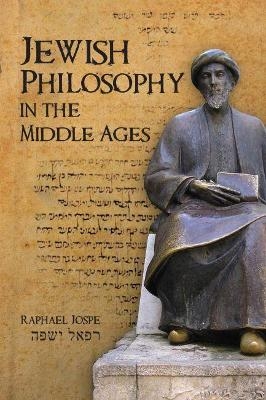
Jewish Philosophy in the Middle Ages
Academic Studies Press (Verlag)
978-1-934843-27-7 (ISBN)
Jewish Philosophy in the Middle Ages presents an overview of the formative period of medieval Jewish philosophy, from its beginnings with Saadiah Gaon to its apex in Maimonides, when Jews living in Islamic countries and writing in Arabic were the first to develop a conscious and continuous tradition of philosophy.The book includes a dictionary of selected philosophic terms, and discusses the Greek and Arabic schools of thought that influenced the Jewish thinkers and to which they responded. The discussion covers: the nature of Jewish philosophy, Saadiah Gaon and the Kalam, Jewish Neo-Platonism, Bahya ibn Paqudah, Abraham ibn Ezra's philosophical Bible exegesis, Judah Ha-Levi's critique of philosophy, Abraham ibn Daud and the transition to Aristotelianism, Maimonides, and the controversy over Maimonides and philosophy.
Raphael Jospe teaches Jewish Philosophy at Bar Ilan University and the Hebrew University of Jerusalem and served as the editor of the Jewish Philosophy Division of the Encyclopaedia Judaica (2nd edition). His publications include a 3-volume Hebrew history, Jewish Philosophy In the Middle Ages, Torah and Sophia: The Life and Thought of Shem Tov ibn Falaquera and a 2-volume collection, Jewish Philosophy: Foundations and Extensions.
Preface. Introduction. Section 1: Foundations. I: What is Jewish Philosophy? I.1 What is Jewish Philosophy? I.2. Philo Judaeus of Alexandria. I.3. The Rise of Jewish Philosophy in the Middle Ages. II: Sa'adiah Ga'on and the Kalam. II.1. Sa'adiah Ga'on and the Kalam. II.2. Sa'adiah Ga'on: Life and Works. II.3. Sa'adiah Ga'on: The Book of Beliefs and Opinions. III: Jewish Neoplatonism: Isaac Israeli and Solomon ibn Gabirol. III.1. Introduction: The Background of Neoplatonism. III.2. Isaac Israeli. III.3. Solomon ibn Gabirol. III.4. Conclusion. IV: Bahya ibn Paquda: The Duties of the Heart. IV.1. Bahya ibn Paquda's Ideological Background. IV.2 The Duties of the Heart. IV.3. The Duties of the Limbs and the Duties of the Heart. IV.4. The Existence of God and the Creation of the World. IV.5. The Unity of God. IV.6. The Divine Attributes. IV.7. Examining the Created World. IV.8. Service of God and Arousal of the Soul. IV.9. The Dialogue of the Intellect and the Soul. IV.10. Trust in God, Predetermination and Free Will. IV.11. Repentance and Arousal. IV.12. Asceticism. IV.13. The Love of God. Section 2: Transitions. V: Philosophical Exegesis of the Bible: Abraham ibn Ezra. V.1. Bible Exegesis as a Philosophical Literary Genre. V.2. Abraham ibn Ezra: Life and Works. V.3. Ibn Ezra and Bible Criticism. V.4. The Bible and Reason. V.5. Cosmogony and Cosmology. V.6. The Names of God. V.7. "He is All and All is from Him". V.8. "The All Knows Particulars in a General Way and not in a Particular Way". V.9. The World to Come ('Olam Ha-Ba). V.10 The Microcosm and Self-Knowledge. V.11 Ibn Ezra and Astrology. V.12. Summary. VI: Judah Ha-Levi and the Critique of Philosophy. VI.1 Introduction. VI.2. Judah Ha-Levi's Life Status and Influence. VI.3. Judah Ha-Levi's Poetry. VI.4. The Intellectual and Cultural Background of Judah Ha-Levi. VI.5. The Kuzari and the Khazars. VI.6. The Kuzari: Structure and Composition of the Book. VI.7. The Prologue to the Kuzari. VI.8. The Haver's Reply: Historical Knowledge vs. Metaphysical Speculation. VI.9. The Uniqueness of Israel and the "Divine Faculty". VI.10. The Land of Israel and the Theory of Climes. VI.11. The Superiority of the Hebrew Language. VI.12. The Transmission of Semitic Culture and Science. VI.13. A Universal Ethic. VI.14. God: Attributes, Names and Actions. VI.15. The Messianic Future. VI.16. Afterword: Judah Ha-Levi's Theory -- Racial or Racist? VII: The Transition to Artistotelianism: Abraham ibn Da'ud. VII.1. Introduction. VII.2. The Life and Works of Abraham ibn Da'ud. VII.3. The Exalted Faith and ibn Da'ud's Place in Jewish Philosophy. VII.4. The Exalted Faith: Selected Themes. VII.5. Conclusion.Section 3: Rambam. VIII: Principles of Judaism. VIII.1. Introduction. VIII.2. Pereq Heleq: "All Israel have a Portion in the World to Come". VIII.3. The Thirteen Principles: Content and Meaning. VIII.4. Rambam's Purpose: Why did Rambam Compose the Thirteen Principles? IX: The Guide of the Perplexed: On God. IX.1. The Guide of the Perplexed. IX.2. On God: The "Via Negativa". IX.3. The Names of God. IX.4. On God: the "Via Positiva". X: The Guide of the Perplexed: On the World and Humans. X.1 Creation. X.2. Prophecy. X.3. The Torah. X.4. Providence and the Problem of Evil. X.5. The Ultimate Human End: Rambam's Ethical and Political Theory. X.6. Conclusion. Section 4: The Controversy over the Philosophy and Rambam. XI The Controversy Over Philosophy and Rambam. XI.1. The Inherent Conflict of Faith and Reason. XI.2. The Historical Background. XI.3. Four Stages or Climaxes. XI.4. The First Climax: During Rambam's Lifetime. XI.5. The Second Climax: 1230-1235 in France. XI.6. The Third Climax: A Renewal of the Controversy in the East, 1288- 1290. XI.7. The Fourth and Final Climax: 1300-1306 in Christian Spain and Provence. Appendices. Appendix I: Cosmology: the Spheres and Emanation. Appendix II: the Categories. Index.
| Reihe/Serie | Emunot: Jewish Philosophy and Kabbalah |
|---|---|
| Zusatzinfo | Illustrations |
| Verlagsort | Brighton |
| Sprache | englisch |
| Maße | 155 x 234 mm |
| Gewicht | 857 g |
| Themenwelt | Geisteswissenschaften ► Philosophie ► Östliche Philosophie |
| Sozialwissenschaften ► Soziologie ► Spezielle Soziologien | |
| ISBN-10 | 1-934843-27-X / 193484327X |
| ISBN-13 | 978-1-934843-27-7 / 9781934843277 |
| Zustand | Neuware |
| Haben Sie eine Frage zum Produkt? |
aus dem Bereich


